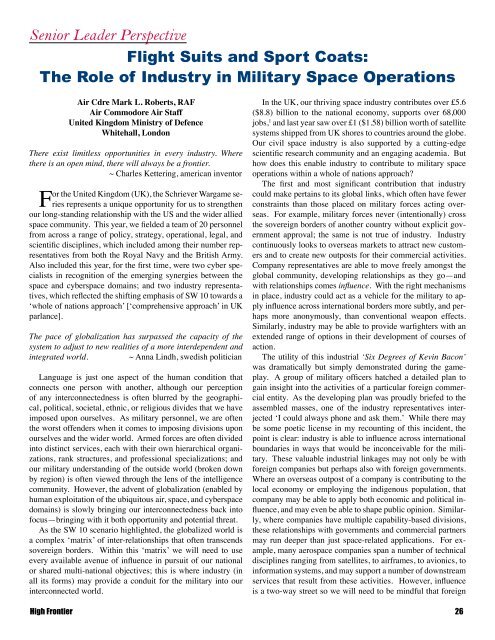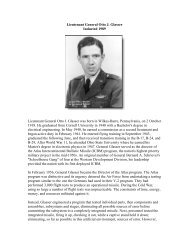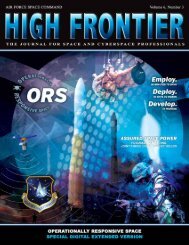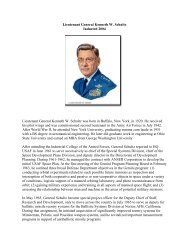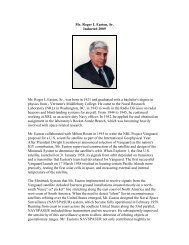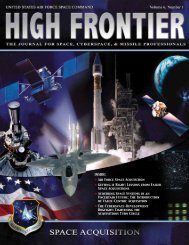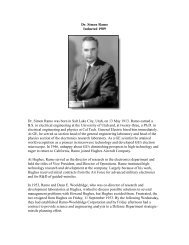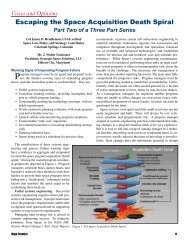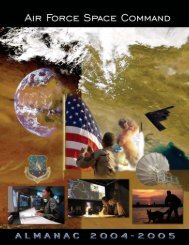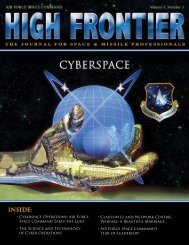Schriever Wargame 2010 - Air Force Space Command
Schriever Wargame 2010 - Air Force Space Command
Schriever Wargame 2010 - Air Force Space Command
- No tags were found...
Create successful ePaper yourself
Turn your PDF publications into a flip-book with our unique Google optimized e-Paper software.
Senior Leader Perspective<br />
Flight Suits and Sport Coats:<br />
The Role of Industry in Military <strong>Space</strong> Operations<br />
<strong>Air</strong> Cdre Mark L. Roberts, RAF<br />
<strong>Air</strong> Commodore <strong>Air</strong> Staff<br />
United Kingdom Ministry of Defence<br />
Whitehall, London<br />
There exist limitless opportunities in every industry. Where<br />
there is an open mind, there will always be a frontier.<br />
~ Charles Kettering, american inventor<br />
For the United Kingdom (UK), the <strong>Schriever</strong> <strong>Wargame</strong> series<br />
represents a unique opportunity for us to strengthen<br />
our long-standing relationship with the US and the wider allied<br />
space community. This year, we fielded a team of 20 personnel<br />
from across a range of policy, strategy, operational, legal, and<br />
scientific disciplines, which included among their number representatives<br />
from both the Royal Navy and the British Army.<br />
Also included this year, for the first time, were two cyber specialists<br />
in recognition of the emerging synergies between the<br />
space and cyberspace domains; and two industry representatives,<br />
which reflected the shifting emphasis of SW 10 towards a<br />
‘whole of nations approach’ [‘comprehensive approach’ in UK<br />
parlance].<br />
The pace of globalization has surpassed the capacity of the<br />
system to adjust to new realities of a more interdependent and<br />
integrated world. ~ Anna Lindh, swedish politician<br />
Language is just one aspect of the human condition that<br />
connects one person with another, although our perception<br />
of any interconnectedness is often blurred by the geographical,<br />
political, societal, ethnic, or religious divides that we have<br />
imposed upon ourselves. As military personnel, we are often<br />
the worst offenders when it comes to imposing divisions upon<br />
ourselves and the wider world. Armed forces are often divided<br />
into distinct services, each with their own hierarchical organizations,<br />
rank structures, and professional specializations; and<br />
our military understanding of the outside world (broken down<br />
by region) is often viewed through the lens of the intelligence<br />
community. However, the advent of globalization (enabled by<br />
human exploitation of the ubiquitous air, space, and cyberspace<br />
domains) is slowly bringing our interconnectedness back into<br />
focus—bringing with it both opportunity and potential threat.<br />
As the SW 10 scenario highlighted, the globalized world is<br />
a complex ‘matrix’ of inter-relationships that often transcends<br />
sovereign borders. Within this ‘matrix’ we will need to use<br />
every available avenue of influence in pursuit of our national<br />
or shared multi-national objectives; this is where industry (in<br />
all its forms) may provide a conduit for the military into our<br />
interconnected world.<br />
In the UK, our thriving space industry contributes over £5.6<br />
($8.8) billion to the national economy, supports over 68,000<br />
jobs, 1 and last year saw over £1 ($1.58) billion worth of satellite<br />
systems shipped from UK shores to countries around the globe.<br />
Our civil space industry is also supported by a cutting-edge<br />
scientific research community and an engaging academia. But<br />
how does this enable industry to contribute to military space<br />
operations within a whole of nations approach<br />
The first and most significant contribution that industry<br />
could make pertains to its global links, which often have fewer<br />
constraints than those placed on military forces acting overseas.<br />
For example, military forces never (intentionally) cross<br />
the sovereign borders of another country without explicit government<br />
approval; the same is not true of industry. Industry<br />
continuously looks to overseas markets to attract new customers<br />
and to create new outposts for their commercial activities.<br />
Company representatives are able to move freely amongst the<br />
global community, developing relationships as they go—and<br />
with relationships comes influence. With the right mechanisms<br />
in place, industry could act as a vehicle for the military to apply<br />
influence across international borders more subtly, and perhaps<br />
more anonymously, than conventional weapon effects.<br />
Similarly, industry may be able to provide warfighters with an<br />
extended range of options in their development of courses of<br />
action.<br />
The utility of this industrial ‘Six Degrees of Kevin Bacon’<br />
was dramatically but simply demonstrated during the gameplay.<br />
A group of military officers hatched a detailed plan to<br />
gain insight into the activities of a particular foreign commercial<br />
entity. As the developing plan was proudly briefed to the<br />
assembled masses, one of the industry representatives interjected<br />
‘I could always phone and ask them.’ While there may<br />
be some poetic license in my recounting of this incident, the<br />
point is clear: industry is able to influence across international<br />
boundaries in ways that would be inconceivable for the military.<br />
These valuable industrial linkages may not only be with<br />
foreign companies but perhaps also with foreign governments.<br />
Where an overseas outpost of a company is contributing to the<br />
local economy or employing the indigenous population, that<br />
company may be able to apply both economic and political influence,<br />
and may even be able to shape public opinion. Similarly,<br />
where companies have multiple capability-based divisions,<br />
these relationships with governments and commercial partners<br />
may run deeper than just space-related applications. For example,<br />
many aerospace companies span a number of technical<br />
disciplines ranging from satellites, to airframes, to avionics, to<br />
information systems, and may support a number of downstream<br />
services that result from these activities. However, influence<br />
is a two-way street so we will need to be mindful that foreign<br />
High Frontier 26


